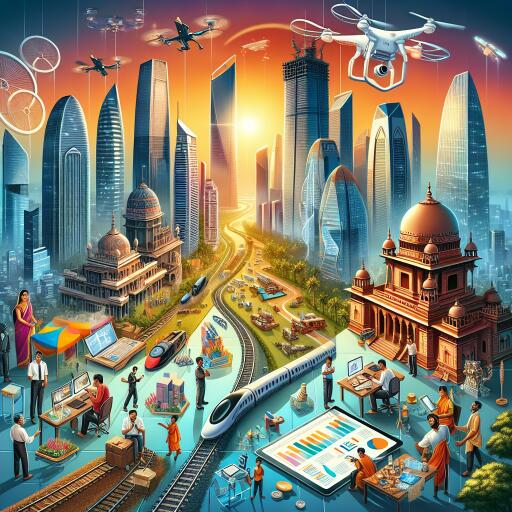
A New Era of Economic Renaissance in India
With an expected GDP growth rate of 7%, India is pioneering economic innovation on a global scale. At the Kautilya Economic Conclave, renowned economist Jagdish Bhagwati highlighted India’s transformation: “India’s economic situation has undergone a complete transformation… We have completely arrived at a new age.” This statement captures India’s remarkable journey from being guided by external advice to now shaping global economic strategies.
The World Bank’s recent India Development Update (IDU) emphasizes this transformation, projecting a robust 7% GDP growth rate for the fiscal year 2024-25, with an optimistic outlook for the future. Additionally, the International Monetary Fund (IMF) reports a significant leap in India’s GDP ranking from the 10th largest economy in 2013-14 to the 5th largest in 2021-22.
The NITI Aayog report on ‘Multidimensional Poverty in India since 2005-06’ reveals that between 2013-14 and 2022-23, 248.2 million people escaped multidimensional poverty, thanks to various government initiatives. This underscores substantial advancements in improving the nation’s prosperity. The National Statistical Office’s Provisional Estimates further highlight India’s economic progress, with a per capita GDP at current market prices standing at ₹2,11,725 for 2023-24.
The positive economic trajectory can be attributed to strategic reforms and visionary leadership over the past decade. A transformative reform was the introduction of the Goods and Services Tax (GST) in 2017, which streamlined the country’s tax system, resulting in GST collections soaring to ₹20.18 lakh crore in 2023-24.
Financial inclusion has been crucial for fostering equitable growth. The Pradhan Mantri Jan Dhan Yojana (PMJDY), launched a decade ago, has revolutionized access to banking, with over 530 million accounts opened by October 2024, significantly reducing economic inequalities. Together with GST, these reforms have propelled India’s shift towards inclusive prosperity.
Since 2014, the “Make in India” initiative has been instrumental in transforming the nation into a global manufacturing powerhouse by simplifying regulations and boosting foreign investment. From April 2014 to March 2024, India attracted an impressive $667.41 billion in Foreign Direct Investment (FDI), bolstering industrial growth and job creation within global supply chains.
Alvaro Santos Pereira from the Organisation for Economic Co-operation and Development (OECD) noted, “India has all it takes to have a strong rate of growth over the next few decades… an entrepreneurial spirit, and a reformist attitude.” His reflections emphasize India’s unique blend of confidence, resilience, and forward-thinking that fuels its economic resurgence.
Infrastructure development remains a cornerstone of India’s growth narrative. Initiatives like the Bharatmala Pariyojana and PM Gati Shakti have revolutionized transportation and logistics, with over 24,000 kilometers of highways constructed in recent years, enhancing connectivity and economic integration. Such projects have not only boosted mobility internally but are pivotal for continued economic expansion.
Innovation plays a critical role in India’s transformation. The Atal Innovation Mission (AIM), introduced in 2016, has empowered young minds by establishing over 10,000 Atal Tinkering Labs in schools. These labs encourage technological exploration and problem-solving skills, fostering an environment for future breakthroughs. The startup ecosystem reflects this vibrancy, now the third largest globally, with over 150,000 recognized startups generating more than 1.5 million jobs by October 2024.
India’s ascent on the international stage is further marked by its G20 presidency in 2023. Under the theme “Vasudhaiva Kutumbakam” (the world is one family), India hosted the 18th G20 Leaders’ Summit, emphasizing its diplomatic leadership in a globally contentious climate. This presidency underlines India’s commitment to global multilateralism amidst rising geopolitical tensions.
India is also at the forefront of sustainable development, with initiatives such as the International Solar Alliance (ISA), aimed at mobilizing $1,000 billion in solar investments by 2030. The upcoming seventh session of the ISA Assembly in New Delhi will further affirm India’s role in global sustainability. By 2023, the renewable energy sector had achieved over 1.02 million jobs, with capacities surpassing 200 GW, signaling progress towards a green future.
India’s journey from receiving advice to becoming a global economic strategist symbolizes its determination and ambition. With persistent reforms, robust development strategies, and an entrepreneurial ethos, India is set for sustained growth. This transformation establishes India as a pivotal player in shaping global economic narratives for the future.





Leave a Reply